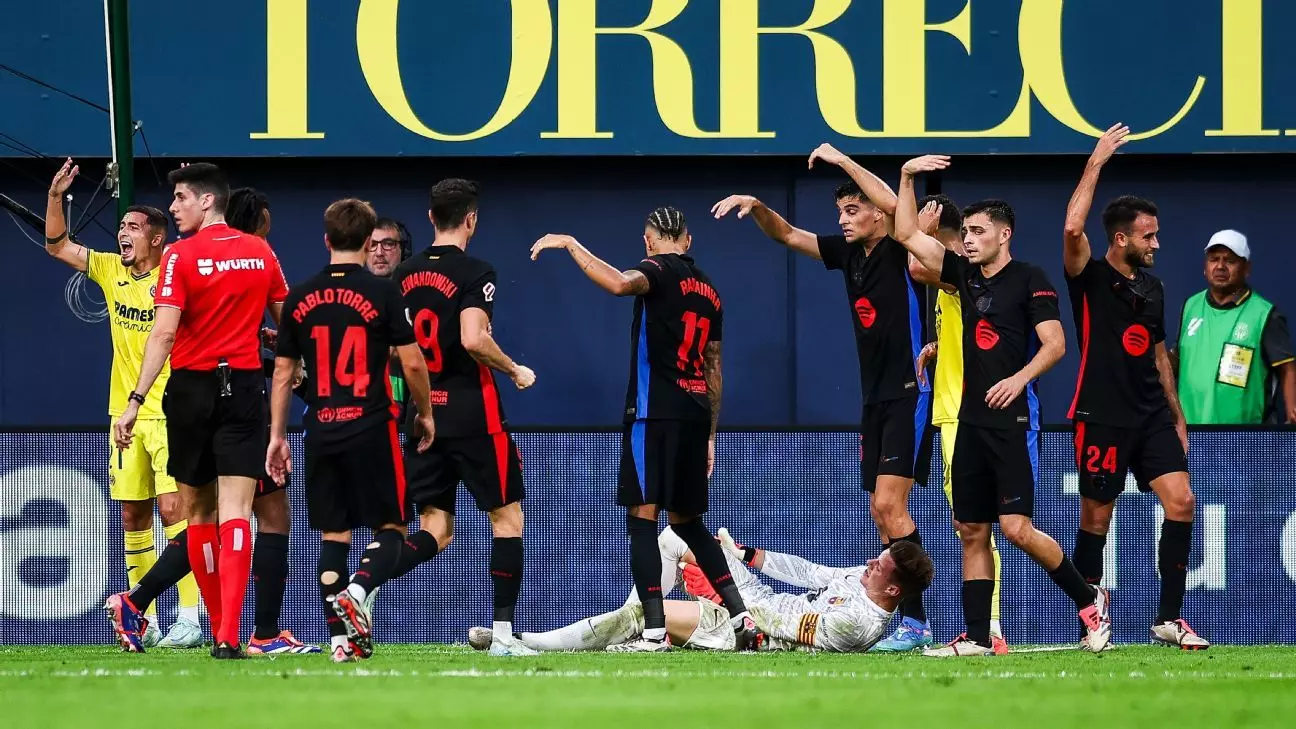In an unexpected turn of events, FC Barcelona’s recent triumph against Villarreal has been overshadowed by the severe knee injury sustained by goalkeeper Marc-André ter Stegen. This article critically examines the implications of this injury, not just for ter Stegen, but for the entire Barcelona squad and their season ambitions.
While Barcelona celebrated a commanding 5-1 victory, the jubilance was abruptly interrupted by ter Stegen’s injury. The German international, a key player for Barcelona, was incapacitated towards the end of the first half after attempting to claim a corner kick. Hansi Flick, the Barcelona coach, described the injury as “huge and serious,” a sentiment that reverberates through the club as they face the potential loss of their primary goalkeeper for months. With rumors circulating that ter Stegen might miss up to eight months of play, including the remainder of the season, the emotional toll on the team and its supporters cannot be understated.
Flick’s immediate reaction hints at the team’s mixed feelings. He expressed a dual sense of pride for the victory but acknowledged the overshadowing sadness tied to ter Stegen’s condition, signalling how individual player welfare can deeply affect team morale. The victory was monumental for Barcelona’s standing, placing them four points clear at the top of LaLiga. Yet, the inflated joy of success is complicated by the potential long-term absence of a player who has proven integral to the team’s defensive structure.
This setback adds ter Stegen to a growing list of injured players that includes Ronald Araújo and Frenkie de Jong, among others. The ramifications of such injuries extend beyond tactical adjustments; they impact team dynamics profoundly. Young players like Sergi Domínguez and Pablo Torre, who were recently handed their first starts, now face increased pressure to perform consistently. Flick has made an admirable choice to trust youth amid a crisis, yet this reliance may not suffice as the season advances.
Barcelona must adapt quickly, bolstered by the mixture of experience and youthful exuberance, but this adaptation comes with risks. The intricacies of communication between a new goalkeeper and an evolving defense will be crucial. Should Iñaki Peña, ter Stegen’s replacement, not settle quickly, Barcelona’s title bid could be endangered, especially against a cadre of teams eager to capitalize on the Catalans’ vulnerabilities.
Additionally, ter Stegen’s injury exemplifies the challenging nature of modern football, where injuries can dramatically alter a team’s trajectory. It brings into focus the physical demands placed upon players and the necessity for clubs to maintain optimal fitness levels throughout the season. With various competitions ongoing, the potential for burnout among other players grows exponentially.
Ter Stegen’s injury also serves as a microcosm of a larger issue within football: the frequency and severity of player injuries. High-pressure schedules, compounded with the demands of both domestic leagues and international competitions, often lead to detrimental physical strain. The sheer volume of games can be overwhelming, and the need for rotation is paramount for sustaining player health and team performance over time.
Flick’s comments point towards an acceptance of the ever-present reality of injuries within the sport. This resignation, however, should not quell efforts to better understand injury prevention and recovery techniques. The football community, led by clubs like Barcelona, could engage in more progressive approaches, focusing on player wellness, recovery periods, and perhaps adjusting competitive workloads to mitigate injury risks.
Barcelona’s ability to secure a decisive win against Villarreal despite ter Stegen’s injury speaks volumes about the team’s mental fortitude. Flick highlighted the resilience and character exhibited by his players, which, in light of their injury woes, may serve as an essential quality for success this season. The players’ capacity to remain focused and perform under duress can be pivotal as they navigate through what promises to be a tumultuous period.
Ultimately, this incident underscores the necessity for depth in squad composition. Success in football hinges not just on star players, but on well-rounded teams capable of tackling adversities swiftly. Barcelona’s youth may be the silver lining in this dark cloud, as the injection of new talent might breathe fresh life into the squad, illustrating that every setback has the potential to cultivate opportunity.
While ter Stegen’s injury is a significant blow for Barcelona, it is also a pivotal moment for growth, resilience, and evolution within the team. As they move forward, maintaining balance between defending their title and nurturing emerging talent will be critical in determining their fate this season.

